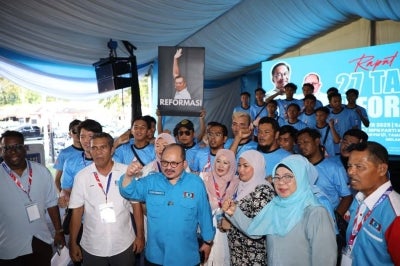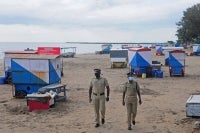Courts should be independent, Rule of Law respected, Nazri calls out PH for interference during govt’ stint
TASNIM LOKMAN - HANI SHAMIRA SHAHRUDIN - SITI NURFATIHAH PIRDAUSKUALA LUMPUR – There are too many interferences to the judiciary, legislative and the Malaysian Anti-Corruption Commission (MACC) during Pakatan Harapan (PH)’s tenure in government, hindering the bodies to carry out their full power to bring justice to the country.
Padang Rengas MP Datuk Seri Nazri Abdul Aziz said he believed that these bodies were under serious attacks with efforts to undermine the independence of the judiciary.
He expressed his full support for the independence of the judiciary and legislative systems, adding that they should not be interfered by any parties.
Nazri cited Lim Guan Eng’s infamous bungalow graft case involving businesswoman Pahang Li Koon which was dropped halfway throughout the case, where the High court not only released the accused but acquitted them of all charges.
“I think too much interference... Maybe not now, there’s no interference now but under Pakatan Harapan, there was interference.
“How can halfway through the case you drop it and there was a stupid remark by the then deputy Law Minister who said that halfway through the case the government thought there is not enough evidence, so they stopped the court case,” he told Sinar Daily in an exclusive interview on Tuesday.

In 2018, then Minister in Prime Minister’s Department (Law) the late Datuk Liew Vui Keong said there was no evidence supporting claims that Umno president Datuk Seri Ahmad Zahid Hamidi owns RM230 million in assets.
Similarly, Sabah Chief Minister Datuk Seri Mohd Shafie Apdal was also cleared from the alleged misappropriation of an estimated RM1.5 billion of funds for rural projects in the state as Liew said there was insufficient evidence, subsequently classified the case as “no further action.”
Liew had said this came after the Attorney-General’s Chambers (AGC) found insufficient evidence, subsequently classified the case as “no further action.”
Nazri said the PH government did not walk their talk of being a fair and just government.
However, now that Prime Minister Datuk Seri Ismail Sabri was leading the government and he himself was a lawyer by profession, Nazri believed that the former would not interfere despite the rumours.
“I do not understand why the Attorney-General (AG) is not taking action against people who are being charged in court but yet openly talking about their innocence.
“They should be talking to the court, not to the public so if they want to respect the rule of law they must take action,” he said, adding that selective prosecution was happening even to this day.
“To me, there is no interference now as there was before but the AG (still) seems to be cautious, careful when there was obvious evidence to show. There has been contempt of court by some people,” he said.
As the former de facto Law Minister when the MACC Act was passed in 2009, Nazri said he felt sorry for the commission as they only wanted to do their job but were not able to do so due to country’s situation.
“Even during the PH government, they appointed someone who’s really useless to be the chief commissioner of MACC. Latheefah Koya (she had) no experience, nothing, not fit to be one also.
“That’s interference, isn’t it? It was so obvious, they interfered in courts, they interfered in MACC, so PH was really not a good example of a government that advocated the Rule of Law,” he said.
He added that he was not surprised that Malaysia was ranked much lower in the Corruption Perception Index (CPI) of Transparency International recently, considering what has been happening in the country for the past few years.
Malaysia’s position dropped from 57 last year to 62 out of 180 countries this year, where the smaller the number in the ranking, the less corrupt a country is perceived to be.
Download Sinar Daily application.Click Here!














